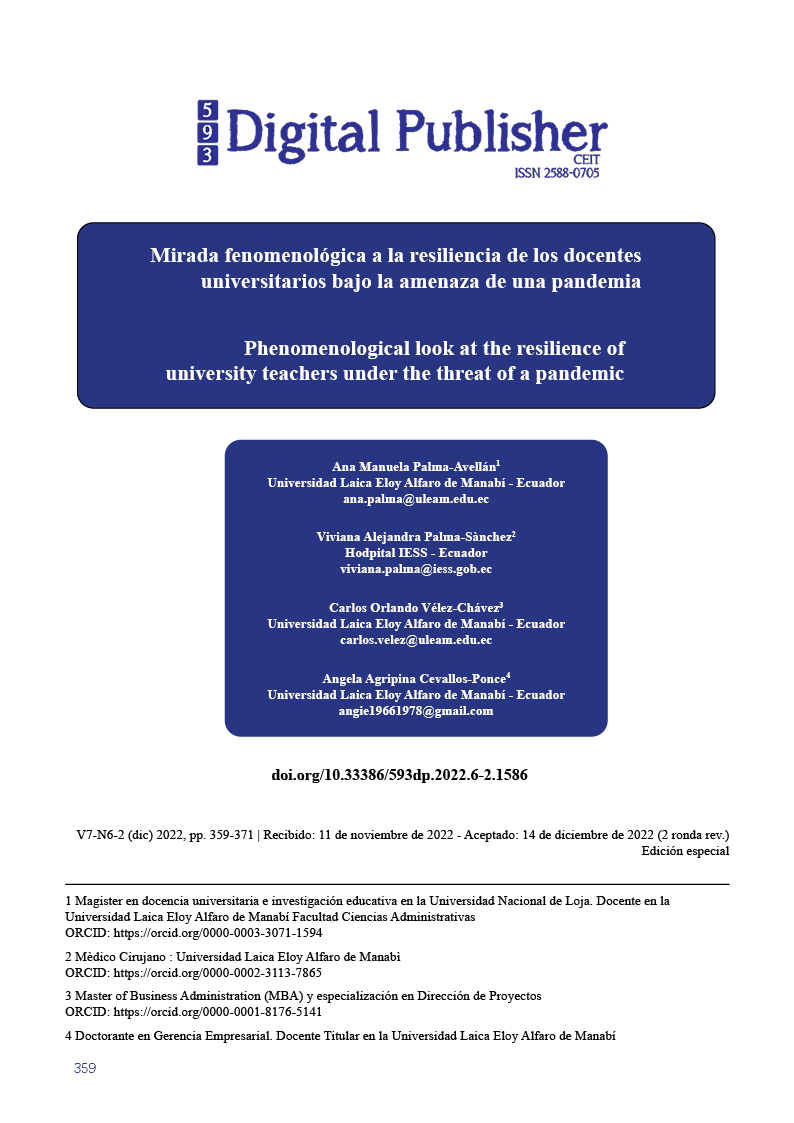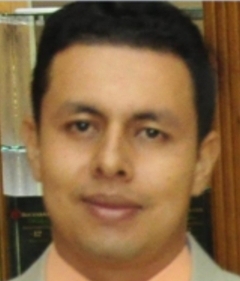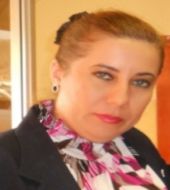Phenomenological look at the resilience of university teachers under the threat of a pandemic
Main Article Content
Abstract
The purpose of this study was to interpret, from a phenomenological perspective, the resilience of university teachers under the threat of a pandemic from the discourses and actions of social actors in the field of university teaching. In this sense, the research is located in the qualitative approach, under the theoretical perspective of interpretivism, methodologically supported by phenomenology and hermeneutics. The reality under study is assumed from an ontologically complex, multiple, divergent context and in a dynamic of permanent construction and reconstruction where intersubjectivity is present throughout the research process. The teachers linked to this research constitute the social actors, who versioned the reality of the study in four (4) teachers belonging to public universities and three (3) to private ones. Phenomenological techniques such as in-depth interviews and focused testimony were used ( virtual); The information obtained was systematized through coding, categorization and triangulation, from which categories such as: occupational psychosocial risk factors, work performance and factors that consolidate the virtual modality emerged. Finally, I present as a conclusive aspect; the university teacher has been favored and strengthened since they resumed their work from other spaces with responsibility, quality, mystique, commitment, trust and futuristic vision, all with the purpose of fulfilling the moral commitment that they have acquired with society to continue in the personal and social training of students, betting on their knowledge and experiences with an attitude of strength, in order to overshadow their weaknesses and face such a situation with integrity.
Downloads
Article Details

This work is licensed under a Creative Commons Attribution-NonCommercial-ShareAlike 4.0 International License.
1. Derechos de autor
Las obras que se publican en 593 Digital Publisher CEIT están sujetas a los siguientes términos:
1.1. 593 Digital Publisher CEIT, conserva los derechos patrimoniales (copyright) de las obras publicadas, favorece y permite la reutilización de las mismas bajo la licencia Licencia Creative Commons 4.0 de Reconocimiento-NoComercial-CompartirIgual 4.0, por lo cual se pueden copiar, usar, difundir, transmitir y exponer públicamente, siempre que:
1.1.a. Se cite la autoría y fuente original de su publicación (revista, editorial, URL).
1.1.b. No se usen para fines comerciales u onerosos.
1.1.c. Se mencione la existencia y especificaciones de esta licencia de uso.
References
Bunje. (2000). Epistemología. México: Siglo Veintiuno.
Caballero, S. (2001). Las competencias gerenciales en tiempos de virtualización. Revista Asuntos, 117-130.
Cathalifaud, A. (2000). Las Universidades como Sistemas Sociales: Estructura y Semántica. Obtenido de Revista MAD, Norteamérica: Disonible en: http://www.revistas.uchile.cl/index.php/RMAD/article/viewArticle/14856 . Consultado 15 de mayo de 2022
Cepal. (2020). América Latina y el Caribe ante la pandemia del Covid-19. Efectoseconómicos y sociales. Informe especial Covid-19. Santiago de Chile: CEPAL.
Dorego, E. (2006). Educación a distancia y evaluación del aprendizaje. Revista deEducación a Distancia, 2-23.
Jarvis, P. (2006). Universidades corporativas: Nuevos modelos de aprendizaje en la sociedad global. Madrid: NARCEA.
Mansilla. (2009). Manual de riesgos psicosociales en el trabajo: Teoría y práctica. Obtenido de Disponible en: http://www.psicologia-online.com/ebooks/riesgos. . Consultado 15 de mayo de 2022
Martínez, A. (2005). Gestión del Cambio y Planificación Estratégica. Madrid: Ayuntamiento de Castellón.
Martínez, M. (2006). Ciencia y Arte en la Investigación Cualitativa. Distrito Federal - México: Editorial Trillas, S.A.
Mendoza, L. (2020). Lo que la pandemia nos enseñó sobre la educación a distancia. Revista Latinoamericana de Estudios Educativos, 343-352.
Morín, E. (2006). La complejidad un modo de pensar. Caracas - Venezuela: Taller permanente de Estudios Epistemológicos en Ciencias Sociales.
Pérez, D. (2003). Procedimiento para la elaborar un modelo de gestión de la seguridad y salud en el trabajo. Habana: Universidad de Cienfuegos.
Quezada, V. (s.f.). Miedo y psicopatología: laamenaza que oculta el Covid-19. Obtenido de Disponible en: https://www.uchile.cl/noticias/163245/miedo-y-psicopatologia-la-amenaza-que-oculta-el-covid-19 . Consultado 25 de mayo 2020
Robinet., A., & Pérez, M. (2020). Estrés en los docentes entiempos de pandemia Covid-19. Polo del Conocimiento.
Román, F., Fores, A., Calandri, I., Gautreaux, R., Antúnez, A., Ordehi, D., . . . Allegri, R. (2020). Resiliencia en docentesen distanciamiento social preventivo obligatorio durantela pandemia de COVID-19. Neuroeducation, 76-87.
Salazar, K. (2020). La resiliencia: una alternativa en tiempos de COVID-19. Notas de. Obtenido de Disponible en: https://web.crim.unam.mx/sites/default/files/2020-05/crim_010_karlasalazar_ . Consultado el 15 de mayo de 2022
Segovia, S., Fuster, D., & Ocaña, Y. (2020). Resiliencia del docente en situaciones de enseñanza y aprendizaje. Revista Electrónica Educare, 1-26.
Soler, E. (2006). Constructivismo, innovación y enseñanza efectiva. Caracas- Venezuela: Colección tesis - Equinoccio.
Taylor, S., & Bogdan, R. (1994). Introducción a los métodos cualitativos en investigación. La búsqueda de los significados. Madrid: Edit Paidós. 2da edicción.
Trujillo, S. (2011). ¿Hay un origen del proceso resiliente? Una lectura de La maravilla del dolor de Boris Cyrulnik. . Revista Psicogente, 164-177.
UNESCO. (2020). COVID-19 y educación superior: Delos efectos inmediatos al día después: Análisis deimpactos, respuestas políticas y recomendaciones. Obtenido de Disponible en:http://www.uncuyo.edu.ar/ciencia_tecnica_y_posgrado/upload/iesalc-covid-19.pdf . Consultado 20 de mayo 2022
Villafuerte, P. (2020). Educación en tiempos de pandemia: COVID-19 y equidad en el aprendizaje. Observatorio de Innovación Educativa.





